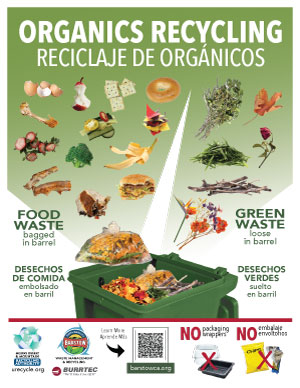ORGANICS Recycling COLLECTION
Residential collection of organics recycling (food & yard waste) is rolling out in our communities.
ORGANICS RECYCLING Collection
Residential collection of organics (food & yard waste) is rolling out in our communities.
Why Curbside Collection of Organics is Important
Composting is Good for the Environment

Organic waste (organics) such as food waste, green waste, landscape and pruning waste, and nonhazardous wood waste make up half of what Californians dump in landfills. When organic waste is sent to landfill, it decomposes anaerobically (without oxygen) which creates methane — one of the most potent greenhouse gases in Earth’s atmosphere. Methane is a short-lived climate pollutant that is 84 times stronger than carbon dioxide over a 20-year period. NASA recently captured satellite images of California landfills and published an inventory showing them as super emitters of methane.
Keeping organic material out of landfills will slow the rate of greenhouse gas accumulation and begin to reduce their impacts.
Composting Helps Your Community

Composting helps California reach our waste reduction goals by keeping organic waste (food waste, green waste and food-soiled paper products) out of landfill. SB 1383 requires the state to reduce organic waste disposal by 75% by 2025. That’s a reduction of 20 million tons annually by 2025. Communities that don’t make significant progress towards achieving these goals can face fines of up to $10,000 per day from the State.
Composting Can Save You Money

Composting reduces the amount of organic waste you discard in the trash, and this saves you the expense of extra trash cans. Organic wastes, including grass clippings, leaves, and shrub pruning, and food scraps can be a large portion of the waste discarded from a single-family home. Approximately 33% of California’s landfilled waste is uneaten food.
Compost is Good for our Gardens
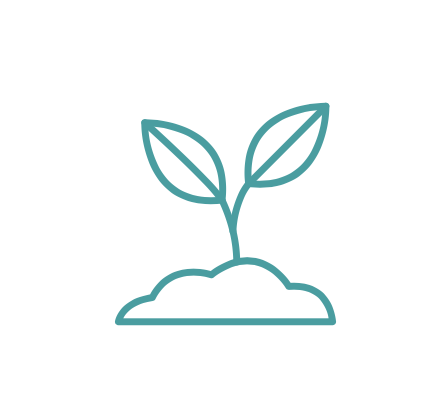
Once collected, your organic waste is processed into compost, a rich soil amendment you can use to grow green lawns and lusher gardens. Adding compost to your soil helps it retain water loosens up heavy soils, and improves plant health by providing nutrients.
California Mandatory Organics Recycling Law: SB 1383
In an effort to reduce greenhouse gas emissions, keep valuable material out of landfills, and create a healthy environment for our community and future generations by recovering natural resources, California has enacted a mandatory organics recycling law that impacts residents and businesses alike. SB 1383 requires the state to dramatically expand its composting abilities and reduce the amount of waste sent to landfills.
The law sets the following targets to be achieved by 2025:
- DIVERT ORGANICS FROM LANDFILL – Reduce statewide disposal of organic waste by 75% from 2014 levels.
- RECOVER EDIBLE FOOD – Rescue at least 20% of currently disposed of edible food (food intended for human consumption) to feed people in need. This portion of the law impacts commercial food generators, not residents.
Why Diverting Organic Waste from Landfill is Important
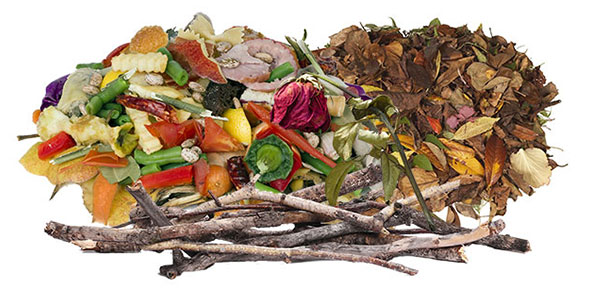 Organic waste (organics) such as food waste, green waste, landscape and pruning waste, and nonhazardous wood waste make up half of what Californians dump in landfills. When organic waste is sent to landfill, it decomposes anaerobically (without oxygen) which creates methane — one of the most potent greenhouse gases in Earth’s atmosphere. Methane is a short-lived climate pollutant that is 84 times stronger than carbon dioxide over a 20-year period. NASA recently captured satellite images of California landfills and published an inventory showing them as super emitters of methane.
Organic waste (organics) such as food waste, green waste, landscape and pruning waste, and nonhazardous wood waste make up half of what Californians dump in landfills. When organic waste is sent to landfill, it decomposes anaerobically (without oxygen) which creates methane — one of the most potent greenhouse gases in Earth’s atmosphere. Methane is a short-lived climate pollutant that is 84 times stronger than carbon dioxide over a 20-year period. NASA recently captured satellite images of California landfills and published an inventory showing them as super emitters of methane.
Keeping organic material out of landfills will slow the rate of greenhouse gas accumulation and begin to reduce their impacts.

Learn more about SB 1383 by visiting the California Department of Resources Recycling and Recovery website.
Curbside Organics Recycling Collection
In an effort to reduce greenhouse gas emissions, keep valuable material out of landfills, and create a healthy environment for our community and future generations by recovering natural resources, California has enacted SB 1383, a mandatory organics recycling (composting) law that impacts residents and businesses alike.
The law requires cities to provide organic waste collection as a means to separate organic materials for landfill diversion and recycling.
To comply with SB 1383, High Desert & Mountain communities are working toward introducing their curbside organics collection program.
The following Authority communities include curbside organics collection along with trash and recycling:
The Town of Apple Valley Curbside Organics Recycling Collection
Residential
The Town of Apple Valley launched its residential organics recycling program in October of 2022. Residents should now place bagged food scraps and loose yard/green waste in their green organics barrel (with the green lid).
Your Organic Recycling Efforts at Work
Take a quick tour of the compost facility where organic waste is processed into a compost with Pamela from the Town of Apple Valley.
What Goes in the Organics Recycling Barrel
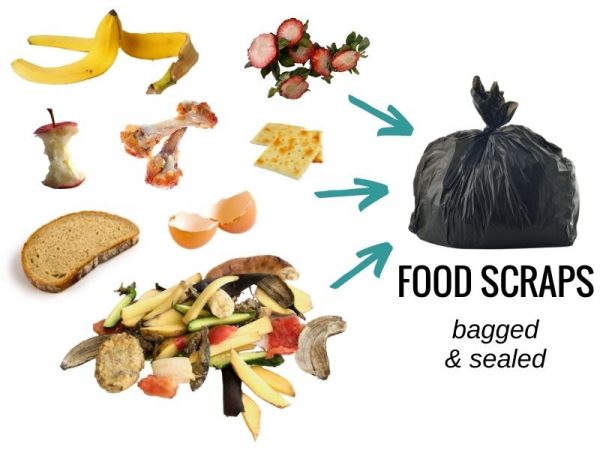
Food Waste/Food Scraps
- Fruit
- Vegetables
- Grains
- Meat
- Small bones
- Seafood
- Leftovers
- Spoiled food
- Coffee grounds
No liquid. Food waste must be bagged and the bag securely closed before placing in your green barrel.
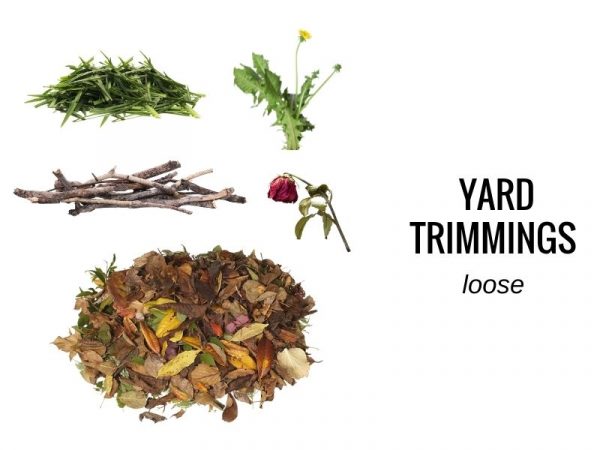
Green Waste / Yard Trimmings
- Grass clippings
- Leaves
- Prunings
- Shrub trimmings
- Small branches
- Twigs
- Weeds
- Dead plants
- Flowers
- Birds of Paradise
Place green waste in your green barrel loose (unbagged).
For more information about the Town of Apple Valley’s organics recycling program, contact the Town of Apple Valley at 760-240-7000 ext 7561 or visit the Town’s Solid Waste Service page.
The City of Adelanto Curbside Organics Recycling Collection
Residential
Residents of single-family homes and multifamily homes should place bagged food scraps and loose yard/green waste in their green organics cart.
Commercial
California legislation requires commercial businesses to establish an organic waste recycling program to divert organic waste from the landfill to be recycled. The state has also established edible food recovery targets for businesses. For more detailed information on regulations and the City of Victorville’s commercial organic recycling programs, visit the City’s Commercial Recycling Programs page.For details please contact AVCO Disposal at 760-245-8607 (Mon-Fri 8 a.m. to 5 p.m.).
What Goes in the Green Organics Cart

Food Waste/Food Scraps
- Fruit
- Vegetables
- Grains
- Meat
- Small bones
- Seafood
- Leftovers
- Spoiled food
- Coffee grounds
No liquid. Food waste must be bagged and the bag securely closed before placing in your green cart.

Green Waste / Yard Trimmings
- Grass clippings
- Leaves
- Prunings
- Shrub trimmings
- Small branches
- Twigs
- Weeds
- Dead plants
- Flowers
- Birds of Paradise
Place green waste in your green cart loose (unbagged).
Barstow Curbside Organics Recycling Collection
Residential
The City of Barstow launched its residential organics recycling program in July of 2022. Residents place bagged food scraps and loose yard/green waste in their green barrel. Residents still have the option to take yard waste to Burrtec’s yard under the Drop-Off Collection Program as an additional means of yard waste recycling.
Multi-Family
Barstow provides multi-family homes with organics collection. All food waste should be bagged (and tied securely closed) and put in the green organics barrel along with loose (unbagged) green/yard waste. The city has specific information about multi-family organics collection on their website here.
Commercial
Many commercial businesses are already recycling their organics under the City’s AB 1826 program for Mandatory Commercial Organics Recycling. For information about commercial organics recycling, visit the City’s Organic Waste Recycling page.
What Goes in the Organics Recycling Barrel

Food Waste/Food Scraps
- Fruit
- Vegetables
- Grains
- Meat
- Small bones
- Seafood
- Leftovers
- Spoiled food
- Coffee grounds
No liquid. Food waste must be bagged and the bag securely closed before placing in your green barrel.

Green Waste / Yard Trimmings
- Grass clippings
- Leaves
- Prunings
- Shrub trimmings
- Small branches
- Twigs
- Weeds
- Dead plants
- Flowers
- Birds of Paradise
Place green waste in your green barrel loose (unbagged).
For more information about the City of Barstow’s organics recycling program, contact the City of Barstow at 760-255-5126 or visit the City’s Organic Waste Recycling page.
Unincorporated San Bernardino County (19A, 20A, and 23A) Curbside Organics Recycling Collection
What Goes in the Green Organics Cart

Food Waste/Food Scraps
- Fruit
- Vegetables
- Grains
- Meat
- Small bones
- Seafood
- Leftovers
- Spoiled food
- Coffee grounds
No liquid. Food waste must be bagged and the bag securely closed before placing in your green cart.

Green Waste / Yard Trimmings
- Grass clippings
- Leaves
- Prunings
- Shrub trimmings
- Small branches
- Twigs
- Weeds
- Dead plants
- Flowers
- Birds of Paradise
Place green waste in your green cart loose (unbagged).
The City of Victorville Curbside Organics Recycling Collection
Residential
The City of Victorville launched its residential organics recycling program in December of 2023. Residents should now place bagged food scraps and loose yard/green waste in their green organics cart. For details, visit the City’s Residential Organics Recycling Program page.
Commercial
California legislation requires commercial businesses to establish an organic waste recycling program to divert organic waste from the landfill to be recycled. The state has also established edible food recovery targets for businesses. For more detailed information on regulations and the City of Victorville’s commercial organic recycling programs, visit the City’s Commercial Organics Recycling Programs page.What Goes in the Green Organics Cart

Food Waste/Food Scraps
- Fruit
- Vegetables
- Grains
- Meat
- Small bones
- Seafood
- Leftovers
- Spoiled food
- Coffee grounds
No liquid. Food waste must be bagged and the bag securely closed before placing in your green cart.

Green Waste / Yard Trimmings
- Grass clippings
- Leaves
- Prunings
- Shrub trimmings
- Small branches
- Twigs
- Weeds
- Dead plants
- Flowers
- Birds of Paradise
Place green waste in your green cart loose (unbagged).
The Town of Yucca Valley Curbside Organics Recycling Collection
Residential
The Town of Yucca Valley, in partnership with the Town’s trash hauler, Burrtec, launched the Town’s Organics Recycling Program to all Yucca Valley residents and businesses in January 2024. Under SB 1383, all food waste, yard trimmings, and other organic materials will need to be separated from the regular trash and either composted or used for energy generation. Organic waste includes food waste, green waste, landscape and pruning waste and non-hazardous wood waste. Residents should now place bagged food scraps and loose yard/green waste in their green organics cart.Commercial
California legislation requires commercial businesses to establish an organic waste recycling program to divert organic waste from the landfill to be recycled. The state has also established edible food recovery targets for businesses. More information on Burrtec’s Business Organics Recycling Program can be viewed here.
Learn More
You can find more information at Yucca-Valley.org/Organics.
Copyright © 2025 Mojave Desert & Mountain Recycling Authority. All Rights Reserved.

